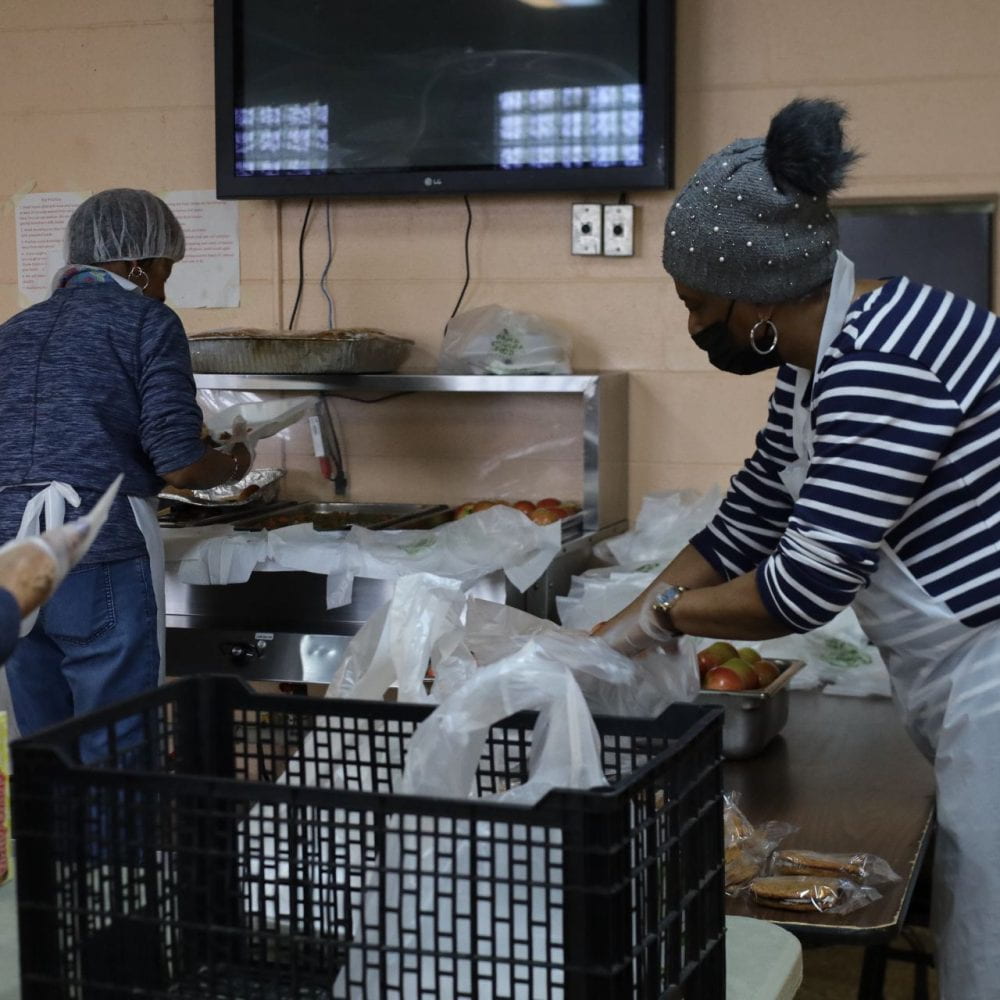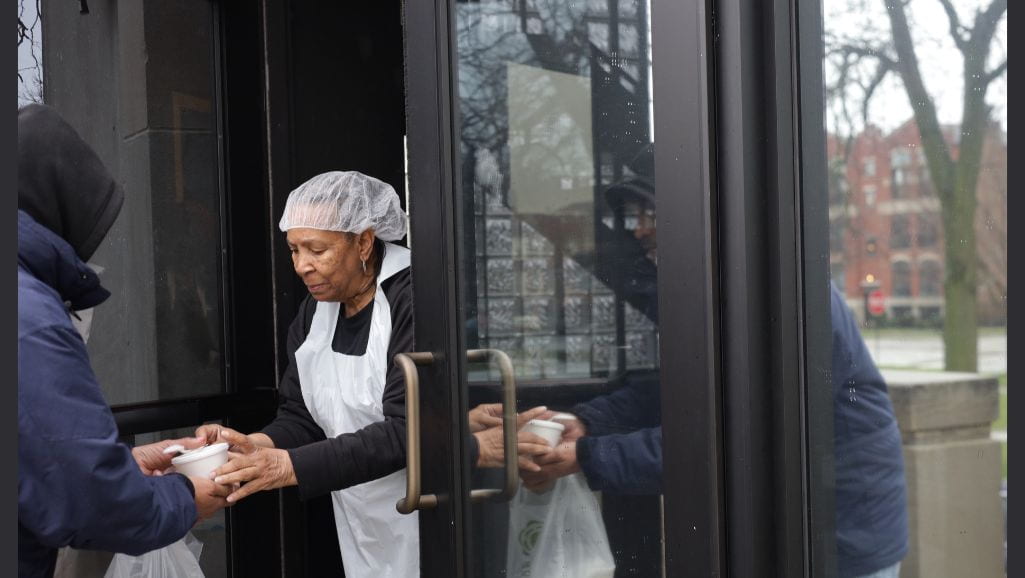Founded in 1872, Saint Stephen African Methodist Episcopal Church, located at 3042 W Washington Blvd in the East Garfield Park neighborhood of Chicago, has had a long history of commitment to the health of its members and their community. In the early 1890s, the congregation was active in the founding of Provident Hospital, the first Black-owned and operated hospital in America. The church serves community members of all ages, with a soup kitchen on Wednesdays and Thursdays, projects at Jacob Beidler Elementary School, senior breakfasts, and forums on fifth Sundays that invite experts on topics such as housing, investment, and public safety to share knowledge with the community. Since September 2023, St Stephen AME Church has partnered with Alive Faith Network and Rush University in Abundant Living, a year-long program to address heart health and financial wellness. The principal investigator of Abundant Living is C3EN co-director Elizabeth Lynch.
Pastor James C. Bailey
“Our church is actively involved with ministering to every age group,” says James C. Bailey, pastor of St Stephen AME since 2011. “For us, it’s not just saying Jesus but also showing Jesus, showing that love and compassion and helping people move forward. We think it’s important to take ownership of our community and see what we can do to make a difference in the lives of those who need it the most.”
Brother Dennis Gary
Brother Dennis Gary, a worship leader in the church, who grew up just a mile and a half down the road from St Stephen, says, “I’ve always been in this community, and I love this community. It’s important for me to stay in the community, as I work in the community. I feel I can be taken more seriously as opposed to someone who does not know the community and what they are going through. And it’s encouraging because I have the opportunity to see the success stories over the years.”
Both Bailey and Gary grew up in families that served their communities through the church. “Dennis’s grandma was in ministry. My mother and father were active in church when I was growing up,” says Bailey. “I always witnessed them serving and doing and making sure people who were hungry were fed. We were always attending to the needs of others. They wanted us to go on to attain education, finance, the American Dream, but when we do receive, it’s not just for us. Let’s make sure whatever we have, we share.”
“Growing up in the church we had an organization called YPD, Young People’s Department,” recalls Gary. “We had training in financial literacy and Black history. We would have missions where we’d gather toiletries and go out into the community and give them to the homeless. We would take sandwiches to the homeless. Knowing what it’s like to want a burger and not be able to afford a burger, that hit home to me.” Citing food access and housing as major concerns, he adds, “It just hurts me to think about how much food we throw away but won’t share. It really don’t take much to share food. I never think I don’t have enough to share. Jesus fed people, he encouraged people, and he asked people how they were doing. If we could do that, we’d be all right.”
As a participant in Abundant Living, St Stephen could make strides on major health concerns common in the community. “Hypertension and heart disease are areas where African Americans are at the top of the list,” says Bailey. “Recently we had seven members of our church become part of the program [Abundant Living]. The whole church was involved and got their blood pressure taken, but seven were able to work with a nutritionist to help get them on the right path. Partnering with Rush allowed us to offer something to the community that was tangible to participate in and could have an immediate impact upon their lives.”
“Because the education portion was open to the whole church, everybody had the chance to meet with the dietician,” says Gary, who assisted the project as a coordinator for the church. “For some people, their blood pressure has gone down a lot. They’ve been encouraged to walk. Meeting with the dietician gave them a safe space to get education and have accountability partners. They’d set goals, like drink more water a day, [and we would ask each other], “Have you drunk more water? Did you fall off? What made you fall off?” And we talked about what it is to eat healthy. You might be eating 8 chicken wings and they’re all fried.. you might not feel comfortable going down to 4, but let’s bake them instead of frying them. Take the skin off to make them healthier. Small steps. People are like, ‘Brother Dennis, did you know that I’m out walking? My blood pressure’s down, my sugar’s down!’ They have more understanding about their health and medications. Being encouraged to talk to their doctors and ask questions about what their medications are doing.”
Gary has also noticed improvements to his own health in the half year since the program began, including drinking more water, reducing soft drink consumption, and developing a regular gym habit–which has contributed to a weight loss of 25 pounds in 6 months. The educational component has also empowered him to take more action in managing his health. “One thing I’ll testify to: I was taking a couple of medications that were making me drowsy. So I went back and talked to my pharmacist, and my pharmacist said, ‘You can’t take these two at the same time; you need to separate them.’ The education has been tremendous,” he says.
As the program continues, Gary anticipates the impact of the financial wellness component on the community. “Rush is providing us with the opportunity to meet with an accountant on a regular basis, so that’s going to help people understand their finances. In our community, there are a lot of people who would love to ask, ‘Hey, how do I create a budget?’ I didn’t understand what a budget was until about two years ago. I still struggle, but I have a better understanding now because I was introduced to the concept. When you talk to a CPA you can understand things even like how you fill out your W2s, your credit score, how you can get a car or a house at a lower rate. The Rush partnership has been vital for the community the last six months.”
About the St Stephen’s continuing efforts to serve their community, Gary says, “I’m looking forward to the future. We’re working on so much, a community garden, trying to expand the food kitchen to feed kids from school. I always harp on food because if you’re hungry, you can’t do nothing! Those top three things, shelter, food, clothes. It’s just peace of mind—if you have a place to stay and food, you can do anything else in the world: you can read a book, you can look for a job.” He describes programs in development including yoga and line-dancing. “We want to invite the community to get outside and do things. I love the joy, the laughter, the camaraderie. The gratitude and the smiles on the faces as they receive. Especially when it’s a really good meal, they’ll have such joy in that and sit out there in the grass in the summertime and eat; it’s almost like a picnic. The joy that people have, the generosity that’s been shared with them, it’s unmatched, it’s so worth it.”
Reflecting on the resilience of the St Stephen AME community, Bailey says, “The winds blow, but you see an ability to keep marching forward. Especially when so many things have been against us, people keep marching on and don’t mind thinking how can I help somebody else along the way.”
St Stephen AME Church hosts a takeaway soup kitchen from 3-5PM every Wednesday and Thursday at 3042 W. Washington Blvd, Chicago.

Photos by Irene Hsiao

